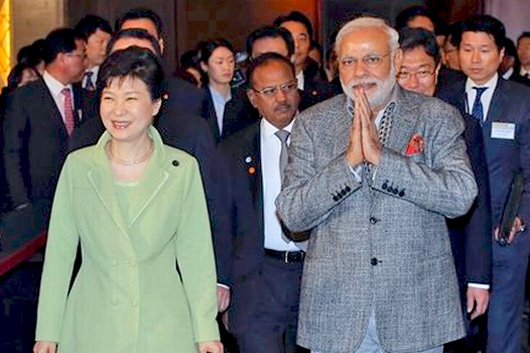Seoul, May 19: Prime Minister Narendra Modi said on Tuesday that India "is the new bright spot of hope" for the region and the world and that the country's progress will help make the Asian dream "a bigger reality".

Addressing the Asian Leadership Forum, which was also attended by South Korean President Park Geun-hye, UN Secretary General Ban Ki-moon and Sheikha Mozah of the Qatar royal family, Modi said that India's progress will be an Asian success story.
He said India's annual growth has rebounded to 7.5 percent and it was poised to grow further.
Modi said: "Asia will succeed more when all of Asia rises together", adding that the prosperous countries must be prepared to share their resources and markets with those who need them.
"Asia must not have two faces - one of hope and prosperity; the other of want and despair. Growth must be more inclusive within and across nations. This is the obligation of national governments, but also a regional responsibility," he said.
"This is the principle that guides India's policies. And, it comes from our timeless belief in the world as one family "Vasudhaiva Kutumbakam".
He stressed on innovation and "frugal manufacturing for affordable renewable energy" to combat climate change.
For Asia's inclusive growth he proposed pooling of innovation and technologies to transform the region's agriculture.
Modi said that by 2025, a majority of Asians will live in cities and India will host around 11 percent of the global urban population.
He said creating livable and sustainable cities of tomorrow should be a collective goal.
"That is why in India, I have placed so much emphasis on urban renewal and smart cities. And, there is much that we can learn from cities like Seoul," he said.
"India is located at Asia's crossroads. And, we will assume our responsibility to build an inter-connected Asia. We must connect our regions through infrastructure and integrate them through trade and investments," Modi said.
He said an Asia with its rise will have to take greater responsibility for the world and it must seek a larger role in global affairs.
He said they must unite to seek reform of global institutions of governance, including the United Nations and its Security Council.
"Asia of rivalries will hold us back. Asia of unity will shape the world," he said.
Later, addressing the India-Republic of Korea CEOs Forum, Modi stressed on the ancient Buddhist links of India and South Korea.
Praising the spirit of entrepreneurship of the Korean people, Modi said he admired the way in which they have created and sustained their global brands.
"We in India want to achieve a lot of what Korea has already done. That is why I, along with a large business delegation, am here. The good news is that India-Korea bilateral trade has risen after the signing of Korea-India CEPA in January 2010," Modi said.
Modi said there is a lot of scope for improvement in bilateral trade.
"South Korea ranks only 14th in FDI flows to India. I can admit that the reason for this low volume of FDI lies with us not with you. But I can tell you that India was and is a land of potential. Now, India is also a land of enabling policy environment," he said.
He assured of the renewed commitment of his government for changing the face of the country. He said there is potential for cooperation between India's software and Korea's hardware industry.
"Your car making and our designing capabilities can be put together. Though we have become the third biggest producer of steel, we need to add a lot of value in it. Your steel-making capacity and our resources of iron ore can be put together.
Your ship-building capacity and our agenda of port led development can become driver of our growth. Infrastructure including housing is another field where we can work together in a big way," Modi said.
Modi said his government is working day and night to create conditions for faster and inclusive growth, adding that international financial institutions, including the World Bank, IMF, OECD and others are predicting even faster growth in the coming years.
"We have restored the global positioning of India in terms of its politics, governance and economy. But we are not going to stop here. We have to and we will do a lot better, he said.
Modi arrived in Seoul on Monday on the third and last leg of his three-nation that also took him to China and Mongolia.





Comments
Add new comment